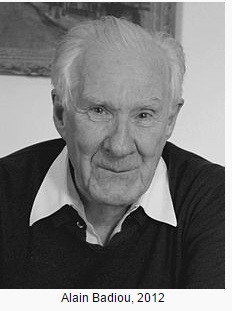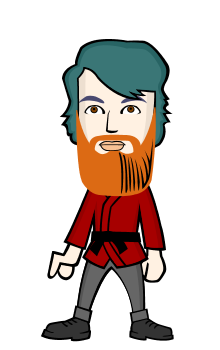
Biography[edit]
Badiou was a student at the Lycée Louis-Le-Grand and then the École Normale Supérieure (1957–1961). He taught at the lycée in Reims from 1963 where he became a close friend of fellow playwright (and philosopher) François Regnault,[1] and published a couple of novels before moving to theUniversity of Paris VIII (Vincennes-Saint Denis) in 1969.[2] Badiou was politically active very early on, and was one of the founding members of the Unified Socialist Party (PSU). The PSU was particularly active in the struggle for the decolonization of Algeria. He wrote his first novel, Almagestes, in 1964. In 1967 he joined a study group organized by Louis Althusser, became increasingly influenced by Jacques Lacan and became a member of the editorial board of Cahiers pour l'Analyse.[2] By then he "already had a solid grounding in mathematics and logic (along with Lacanian theory)",[2] and his own two contributions to the pages of Cahiers "anticipate many of the distinctive concerns of his later philosophy".[2]
The student uprisings of May 1968 reinforced Badiou's commitment to the far Left, and he participated in increasingly militant groups, such as the Union des communistes de France marxiste-léniniste (UCFml). To quote Badiou himself, the UCFml is "the Maoist organization established in late 1969 byNatacha Michel, Sylvain Lazarus, myself and a fair number of young people".[3] During this time, Badiou joined the faculty of the newly founded University of Paris VIII/Vincennes-Saint Denis which was a bastion of counter-cultural thought. There he engaged in fierce intellectual debates with fellow professorsGilles Deleuze and Jean-François Lyotard, whose philosophical works he considered unhealthy deviations from the Althusserian program of a scientificMarxism.
In the 1980s, as both Althusserian Marxism and Lacanian psychoanalysis went into decline (after Lacan passed away and Althusser was committed to a psychiatric hospital), Badiou published more technical and abstract philosophical works, such as Théorie du sujet (1982), and his magnum opus, Being and Event (1988). Nonetheless, Badiou has never renounced Althusser or Lacan, and sympathetic references to Marxism and psychoanalysis are not uncommon in his more recent works (most notably Petit panthéon portatif/Pocket Pantheon).[4][5]
He took up his current position at the ENS in 1999. He is also associated with a number of other institutions, such as the Collège International de Philosophie. He was a member of "L'Organisation Politique" which, as mentioned above, he founded in 1985 with some comrades from the Maoist UCFml. This organization disbanded in 2007, according to the French Wikipedia article (linked to in the previous sentence). In 2002, he was a co-founder of the Centre International d'Etude de la Philosophie Française Contemporaine, alongside Yves Duroux and his former student Quentin Meillassoux.[6] Badiou has also enjoyed success as a dramatist with plays such as Ahmed le Subtil.
In the last decade, an increasing number of Badiou's works have been translated into English, such as Ethics, Deleuze, Manifesto for Philosophy,Metapolitics, and Being and Event. Short pieces by Badiou have likewise appeared in American and English periodicals, such as Lacanian Ink, New Left Review, Radical Philosophy, Cosmos and History [2] and Parrhesia. Unusually for a contemporary European philosopher his work is increasingly being taken up by militants in countries like India, the Democratic Republic of Congo and South Africa.[citation needed]
Recently Badiou got into a fierce controversy within the confines of Parisian intellectual life. It started in 2005 with the publication of his "Circonstances 3: Portées du mot 'juif'" – The Uses of the Word "Jew".[7] This book generated a strong response with calls of Badiou being labelled Anti-Semitic. The wrangling became a cause célèbre with articles going back and forth in the French newspaper Le Monde and in the cultural journal "Les temps modernes." Linguist and Lacanian philosopher Jean-Claude Milner, a past president of Jacques Derrida's Collège international de philosophie, has accused Badiou of Anti-Semitism.[8]
In 2014, Badiou assumed the role of president at the Global Center of Advanced Studies.[9



